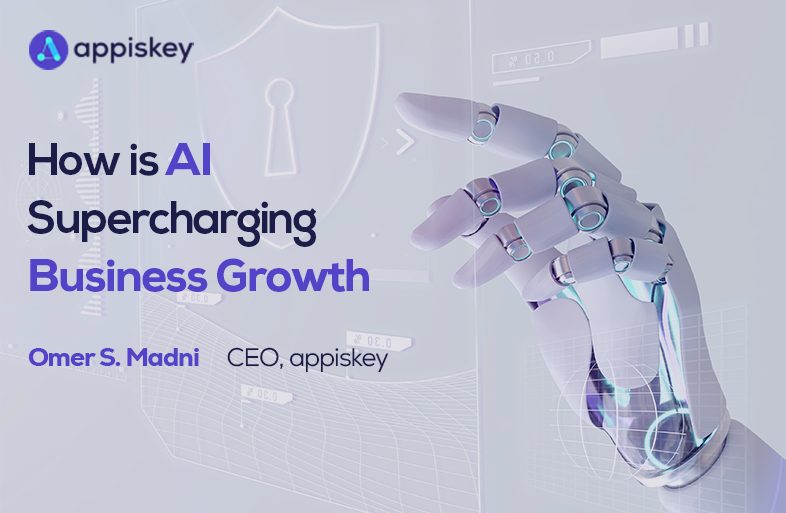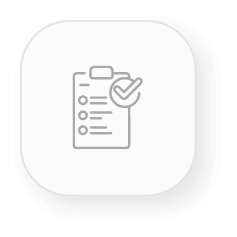How is AI Supercharging Business Growth?

As Artificial Intelligence/ Machine Learning becomes increasingly universal, businesses stand in the front row to reap significant benefits through it. Even after the likes of Elon Musk and AI experts asking tech companies to fight off the urge to produce AI/ ML systems, which in itself sounds like a pretty compelling strategy to miss out on the new wave of next gen tech.
The open letter signed by approx. 30,000 people have signatories like Elon Musk and Steve Wozniak. Stating the ‘possible’ negative impact AI would have on society if experiments, as big as GPT4, continue the same way for the next six months, (sounds like a convenient timeline to kickstart a mega AI/ ML product).
With Musk’s drive to lead the AI/ ML realm contradicting with his statements, his movement in this domain clearly suggests otherwise. X.AI is the new brainchild of Elon Musk with countless other AI/ ML products already in the market that is set to revolutionize the specific industry it caters.
Businesses streamlining ‘growth’ with AI
The number of businesses adopting AI has also seen a massive growth of 270% in just 4 years. Looks like the ripples of this disruption are likely to continue for the foreseeable future. Deloitte reported that AI-powered quality control solutions can save businesses up to 50% on what they spent earlier.
However, realistically speaking, the role of this disruptive new technology has been very antagonizing, and movies are to blame for this. Even when Artificial Intelligence is spreading its wings and showing the world what it’s capable of. We can’t help but associate it with typical sci-fi dystopias where Production houses like Universal Studios, 20th Century Studios, Warner Bros., are jumping on the bandwagon to produce horrors with the integration of Artificial intelligence and Machine learning.
Despite the negative rendition, the utilization of Artificial Intelligence in the entertainment & media market is expected to grow to $34.86 billion by 2027. From scriptwriting and better casting decisions to enhancing the post-production quality through hyperrealistic VFX and so much more. Artificial Intelligence has gotten quite a significant break, to say the least.
The time has come for businesses across all major industries to start leveraging the full potential of artificial intelligence to their advantage. What remains to be seen is the extent to which it will impact various industries. Will the change be common to businesses across all major industries or would some be left out? Only time – and this blog – would tell.
First Things First, What is Artificial Intelligence?
Artificial Intelligence is an exciting field involving the development of digital solutions capable of performing tasks that traditionally required human intelligence. From visual perception and speech recognition to decision-making and language translation – it’s all going to be revolutionary for businesses!
Think of it as having a super-smart assistant that never gets tired, or makes mistakes due to lack of concentration. Thanks to its iterative processing algorithms, Artificial Intelligence’s expert systems can learn from data, reason, and make decisions almost as well as a human can.
Artificial Intelligence has the power to transform industries unlike ever before. As a matter of fact, the entertainment and healthcare industries are the top ones to reap AI’s benefits. Speaking of the entertainment industry, OTT streaming platforms are using AI algorithms to engage users through personalized recommendations. This is just one example, we’ll discuss more shortly. Meanwhile, in the healthcare industry, Artificial Intelligence is improving the quality of care through quicker drug discovery, disease detection, and more.
The aforementioned examples are just the tip of the iceberg. The potential benefits of AI for businesses are virtually limitless. Long story short, organizations that embrace expert systems – regardless of the industry they belong to – can stay ahead of the curve and remain competitive in today’s constantly altering business landscape.
Let’s Talk AI with a Business-Specific Approach
With its ability to automate routine tasks and generate valuable insights, Artificial Intelligence has become a must-have for forward-thinking companies.
Today’s business leaders are obsessed with a new kind of AI – one that doesn’t require complex equipment or robots. Rather, it involves software that automates operations, makes intelligent decisions, and provides a roadmap to act on those decisions.
For businesses in constant pursuit of innovation, integrating knowledge engineering into core applications takes the hassle out of routine tasks. It further enables employees to focus on higher-level strategic initiatives.
All in all, the transformative impact of Artificial Intelligence adds tremendous efficiency to core business applications. Here are a few of them.
AI in Sales
According to HBR, AI-led companies boosted their leads by up to 50% and reduced costs by 40 to 60%. This confirms, incorporating such practices in sales unlocks a multitude of benefits for companies looking to gain a competitive advantage.
Uses of AI in Sales
Lead Scoring
AI-powered lead scoring allows sales experts to use machine learning algorithms to categorize & prioritize leads that pose the highest probability of conversion.
Sales Predictions
Sales experts use data analytics to identify sales trends and patterns. This leads to accurate sales forecasts with improved sales strategies.
Chatbots & Virtual Assistants
AI-powered chatbots & virtual assistants enhance customer involvement. They provide immediate and personalized customer support, leading to better customer experience and satisfaction.
Sales Performance Analysis
AI is capable of analyzing sales performance data to identify areas of improvement, optimize sales strategies, and enhance team productivity.
Sales Automation
AI automates repetitive and time-consuming sales tasks, allowing subject-matter experts to focus better on high-priority activities such as lead generation, customer relationship management, etc.
AI in Marketing
An estimated 48% of marketing professionals believe that AI’s role has been pivotal in how customers interact with them. AI-powered marketing practices allow marketers to create more effective and efficient marketing strategies, tailored right according to customers’ needs & preferences.
Uses of AI in Marketing
Customer Segmentation
AI marketing enables marketers to identify patterns and segment customers based on their behavior, interests, and demographics. This ultimately leads to targeted marketing campaigns that resonate well with each identified customer segment.
Personalization
AI is brilliant at analyzing consumer data that marketers can use to send personalized marketing messages and product recommendations to their customers. This leads to higher engagement and conversion rates.
Content Creation & Optimization
Marketers get to identify and utilize various types of content that keep the customers hooked throughout the different stages of their journey. Additionally, AI-backed tools facilitate prompt insights to marketers allowing for content optimization for search engines and social media.
Search Engine Optimization
AI-led SEO paves way for higher search engine rankings and better website traffic. This happens through a comprehensive analysis of data and patterns that marketers use to optimize website content. Moreover, AI-led SEO also allows marketers to tackle technical SEO issues that may surface due to search engine algorithm changes.
Targeted Advertising
AI analyzes heaps of consumer data to determine high-quality leads. The leads are subsequently targeted through apt advertising campaigns leading to boosted conversion. Long story short, for marketers struggling with conversion rates, this could be a goldmine!
AI in Customer Support
“No business can stay in business without customers.” – Harvey Mackay
Albeit resolving customers’ issues is the primary goal for every business. However, while trying to focus on other operations, it may be a challenge to maintain an unhindered stream of communication.
With AI-led practices, businesses can provide prompt and effective responses to customers who reach out for help. This approach also assists in maintaining a positive reputation among competitors.
Uses of AI in Customer Support
Chatbots & Virtual Assistants
AI-powered Chatbots are making a re-entry! For professionals in customer support, chatbots and VAs can provide immediate support by promptly answering frequently asked questions and resolving common issues.
Human-Like Conversations
AI utilizes Natural Language Processing to understand and respond to customer inquiries in a conversational manner. Once again, this leads to higher customer satisfaction and better retention rates.
Call Routing & Escalation
AI analyzes customer inquiries and routes them to the appropriate support agent or team, leading to faster resolution times and improved customer satisfaction. No more waiting on hold!
AI in Core Operations
AI is already on its way to helping businesses achieve digital transformation more rapidly than they could imagine. Whether it’s for managing employee payrolls or running inventory checks, AI is winning at all of it.
Uses of AI in Core Business Operations
Automating Core Processes
AI proficiently automates recurring routine tasks, freeing up employees’ time and eventually letting them focus on higher-level tasks that require more of their attention & expertise.
Predictive Maintenance
As the name suggests, AI predicts which equipment is in need of maintenance at what time. This leads to minimized operational downtime and cost-effective maintenance rounds.
Organization-Wide Network Analysis
This one is for Human Resources. AI enhances organizational sustainability by comprehensively analyzing all formal business relationships. This aids in developing growth-centric business strategies that lead to improved employee collaboration and better decision-making.
Supply Chain Optimization
AI collects all the useful data from business suppliers, logistics partners, and other sources to optimize supply chain operations. This practice leads to reduced costs and improved delivery times.
Inventory Management
AI is also capable of running comprehensive analyses of inventory-level data including sales trends, and various other factors. This aids in optimizing inventory management for reduced excessive products and minimized stockouts.
Payroll Automation
For financial experts crunching numbers, AI-powered tools can efficiently calculate payroll and deductions. Moreover, AI also assists businesses to stay compliant with tax laws and regulations.
AI in Businesses – The Benefits That Yield
Investing in AI-focused practices puts companies on the frontline to success. With AI, businesses can enhance their competitiveness, reduce operational costs, increase customer satisfaction, and above all, facilitate innovation.
The benefits of Artificial Intelligence are simply too great to ignore, and companies that fail to invest in this transformative technology risk falling behind. By making AI an indispensable part of their operations, businesses can unlock new levels of efficiency and innovation, and position themselves for success both today and in the years to come.
That’s not all. Here are some more benefits that businesses can experience with AI by their side.
Automation
Mid-level organizations often face challenges such as limited resources, high competition, and a need to innovate. With AI in the mix, businesses can address these pain points in various ways. For example, AI-powered automation solutions can help mid-level organizations automate routine tasks, enabling their employees to focus on higher-level tasks that require more attention and creativity.
Secondly, AI-led automation allows businesses to save extra bucks that they previously had to set aside for manual labor and optimizing operations. All in all, in today’s rapidly altering business landscape, AI-powered automation can drive businesses toward becoming more competitive, innovative, and most importantly, agile.
Boosted Operational Efficiency
Let’s discuss this with a real-world example. Bosch, a German manufacturing company implemented an AI-powered predictive maintenance system that reduced the overall downtime by up to 70%.
This ultimately led to increased revenue and growth. By leveraging AI technology, Bosch was able to identify equipment failures before they occurred, with reduced maintenance costs and improved overall operational efficiency.
Better Customer Experience
AI’s brilliant predictive analysis skills allow businesses to provide personalized customer experience through a comprehensive analysis of their behavior and preferences. As a matter of fact, Accenture estimated that AI-powered personalized customer experiences can increase revenue by up to 38%.
With AI’s ability to analyze customer behavior and preferences, companies can make well-informed business decisions that can ultimately lead to boosted sales and reduced marketing costs.
Intelligent Decision-Making
When it comes to intelligent decision-making or paving the way for intelligent decisions, AI has been doing a pretty good job. Let’s be real, to comprehensively analyze huge chunks of data, as quickly as possible is a job not meant for us humans.
However, for AI, that’s like a regular day at work.
With Artificial Intelligence and its expert systems, businesses can gain quick insights into massive chunks of meaningful data pertaining to market trends, consumer behavior, and competitor activities. All of this data can ultimately lead businesses to make more informed decisions that resonate well with the company’s initial mission and goals.
Navigating Through Financial Challenges
No business is ever enough prepared to deal with the brunt of the global economical interlude. With chances of recession and inflation always looming in the corner, businesses are likely to face massive roadblocks such as declining sales, increasing costs, and shrinking profit margins sooner or later.
Artificial Intelligence allows businesses to navigate through financial challenges by analyzing financial data for potential inefficiencies, automating financial tasks, and providing real-time insights into cash flow, revenue, and expenses. Moreover, by leveraging AI-powered predictive analytics, businesses can make quick, data-driven financial decisions for efficient risk mitigation.
Industries That Are Likely to Be Disrupted by AI
AI’s ability to intelligently automate repetitive processes makes it a disruptive force across various sectors. Companies are eager to leverage AI due to its transformative potential and ability to drive innovation and growth.
While AI can be applied to a wide range of industries, these are the ones that are faring much better with AI added to their routine operations.
Agriculture
From analyzing large amounts of data in real-time to precision farming, crop yield optimization, crop disease detection, and livestock management, AI can help farmers operate with tremendous efficiency. AI ensures crops incur minimum wastage with enhanced sustainability.
AI in agriculture has the potential to revolutionize the entire industry through effective crop management. As AI technology continues to evolve and gain accessibility, more and more farmers are likely to adopt it to stay competitive in the market.
Entertainment
AI utilizes algorithms to facilitate personalized recommendations for movies and TV shows based on viewing history and preferences. This allows OTT streaming services such as Netflix, Hulu, etc., to increase user engagement. AI is also being used to create content, such as music, artwork, and even scripts.
AI is additionally reducing the hassle associated with color grading, noise reduction, and identifying the best takes from a batch of footage. For live events and trips to places like Disneyland and Universal Studios, AI creates an optimized itinerary for attendees so they can spend less time waiting in lines and more time having the time of their lives.
Legal
With AI-powered systems, legal professionals can get meaningful insights into management, billing, and time tracking and use this information to improve their practice’s efficiency and profitability.
From analyzing large amounts of data quickly and accurately to case prediction, legal document analysis, e-discovery, and legal practice management, AI can help legal professionals provide more accurate, efficient, and informed services to their clients.
Retail
AI will continue to transform the way retailers interact with customers while having their operations immaculately optimized. AI is enabling retailers to utilize meaningful data and create high-impact marketing campaigns that are sure to earn them a top spot among competitors.
Conclusively, AI is helping retailers to stay competitive in this rapidly evolving industry by delivering greater value and convenience to customers while streamlining complex, recurring operations.
Healthcare
AI’s most promising contribution to healthcare has to be Medical Imaging, where machine learning algorithms analyze images with more immaculate accuracy and efficiency than human experts. This leads to accurate diagnosis and treatment planning.
Moreover, AI can also be used to monitor patient health remotely. Healthcare providers can detect and respond to potential health issues before they become acute. In addition, AI-powered virtual assistants can provide patients with personalized care and assistance. Overall, AI has the potential to revolutionize healthcare with improved & efficient quality of care.
Hospitality & Tourism
With the help of machine learning algorithms, hotels, and resorts can personalize recommendations and services for guests while providing a tailored and enjoyable stay. AI can also improve revenue management and pricing strategies by analyzing demand patterns and predicting occupancy levels. This allows hotels to optimize their pricing and maximize their revenue streams.
Overall, AI possesses all the potential to create a more efficient, personalized, and sustainable hospitality and tourism industry, where both, customer experiences and business operations can get to thrive in equilibrium.
Marketing
With AI, marketers can analyze vast amounts of data to get a better grasp of consumer behavior, preferences, and intent. This yields highly personalized and relevant content that resonates with brands and their target audience.
Additionally, marketers can enjoy the perks of automated email marketing, social media posting, and ad optimization, which would ultimately allow them to put all their focus on strategic initiatives. To wrap everything up, AI in marketing leads to improved ROI and sure-shot business growth.
Energy & Utilities
With AI-powered systems, energy & utility businesses can analyze data on renewable energy production, energy storage, and consumption to optimize renewable energy usage. Businesses can also analyze energy demand patterns, weather conditions, and energy prices to predict & manage energy demand in real time.
Moreover, reducing the risk of power outages, improving energy grid stability, and lowering energy costs for businesses and consumers also become all the more achievable, thanks to AI-powered solutions for energy & utility businesses.
Software Development
AI-powered practices will expedite the coding process through automated tasks such as code generation, testing, and maintenance. Developers won’t have to spend hours manually coding. Because AI algorithms would analyze existing codebases, and generate new code in the shortest period.
Artificial Intelligence also detects underlying bugs in the software and further enables developers to utilize user interaction data to optimize their software’s performance and user experience. All in all, AI’s transformative impacts might have to meet with some adjustments down the line, but its benefits remain significant. Companies operating in the software industry that decide to elevate their coding processes with AI are likely to succeed in the future.
AI & Modern Business – What Does the Future Hold?
As we dive deeper into the digital age, the integration of Artificial Intelligence into modern businesses has become an undeniable reality. The potential for AI to revolutionize the way we work is massive, and companies that ignore its capabilities are sure to be left behind.
Undeniably, one of the biggest flexes of AI has to be automation. It saves businesses a ton of their time and money through streamlined processes, reduced errors, and improved operational efficiency.
Just like strategic pivots help businesses turn over a new leaf in challenging situations, AI is expected to help businesses stay resilient amid the evergrowing competition. On every corner, there’ll be advanced applications in areas such as customer service, marketing, and finance, and businesses would not hesitate to go the extra mile to experience the benefit of those applications.
Albeit, this seems like an opportunity that no business would ever want to miss, employees on the other hand are raising eyebrows over the potential job losses that Artificial Intelligence might lead to.
Hopefully, there’ll be a solution for that. Let’s keep our fingers crossed.
Artificial Intelligence – A Supposed Grey Area
Artificial Intelligence has tremendous potential to revolutionize whatever industry it touches. However, there are a handful of potential moral and ethical concerns that need to be addressed. One of the main concerns is AI potentially perpetuating and exacerbating existing social and economic inequalities. This usually occurs when algorithms are biased or have been trained on biased data, leading to discriminatory outcomes.
Another concern posed by Artificial Intelligence is the lack of transparency and accountability. Because of that, it’s a challenge to incorporate its findings into real-world scenarios, regardless of how promising the outcomes may seem.
As Artificial Intelligence systems become more complex and autonomous, it has become increasingly difficult to understand how they make decisions or how they’d be held accountable for their actions.
Additionally, AI poses some alarming concerns about being used for malicious purposes, such as cyber-attacks or the development of weapons. Therefore, to minimize the possible brunt of AI and to cohere with the values and principles, businesses utilizing this technology for their benefit must never steer away from the ethical frameworks and guidelines.
All Things Considered
AI is already being used in many industries for enhanced efficiency, accuracy, and safety. Therefore, halting its progress might create ripples of negative consequences. Rather, stakeholders should prioritize developing responsible AI policies & regulations – the benefits of which outweigh the potential risks.
Regardless of all the concerns and whatnot, the future of AI in modern businesses is looking as bright as ever. As companies continue to integrate AI-powered solutions into their operations, they will be better equipped to adapt to changing market conditions, stay ahead of competitors, and provide better value to customers.
To wrap this up, if you’re a business looking to thrive in this increasingly competitive digital space through apt AI implementations, Appiskey will light the way for you. Write to us at info@appiskey.com and schedule a consultation session with our subject matter experts to figure out the way forward.















